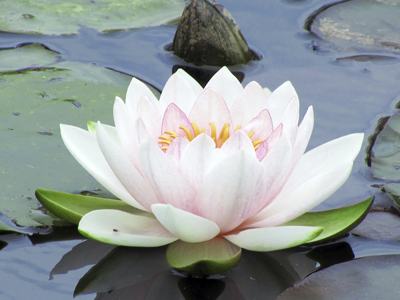
 |

|
I’m probably going to get in trouble for saying this, but I think Buddha was wrong. Or at least the main teaching of Hinayana—or “Lesser Vehicle”—Buddhism, that the goal of meditation and right life practices is the state of enlightenment, is wrong. Any final end state of understanding, where all knowledge and precepts are fixed and nothing more can be attained, is simply not part of the human experience. And no, the bodhisattvas are not some other form of being, some kind of supermen, but just regular human beings who have trained their minds in certain ways of thinking.1
In my view, all life—human life, animal life, evolution on this planet, and by extension the life cycles of stars and galaxies—is transition. So long as you are alive, you are engaged in a process. It starts with the combination of egg and sperm and the first unraveling of the embryo’s DNA to create differentiation and development of specialized cell types. It ends with the failure of major organs that support cellular metabolism and the dissolution of the body’s tissues. Everything in between is process and change.
In the same way, stars begin when enough dust and gas collect in one place through electrostatic attraction, the collapse into a compact mass through the attraction of gravity, and the ignition of a fusion reaction through internal pressure. It ends with the exhaustion of fuel, and the final collapse into a neutron star or black hole. Everything in between is process and change.
In both cases, the only end state is death, the stilling of all processes, the unchanging forever of nothingness. Dead people cannot be detected or resurrected as dust and component atoms. Neutron stars can only collect more dust and mass, changing regular atoms into a jostling compaction of stripped neutrons, until they reach enough mass to disappear into a black hole and never be seen again, except for the effects of gravity.
Human beings with their subtle brains seem to long for a living end state. A final attainment of enlightenment, complete understanding, with nothing more to experience, no doubts, nothing more to endure, no reason ever to change again. This is a fantasy.
You can no more learn all there is to know—or all that’s important—and stop thinking than you can flap your arms and fly like a bird. You might be able to believe your brain has stopped because you have temporarily shut out the mutter of background thoughts that come with the firing of random synapses outside of your conscious, focused attention.2 But even if you are very strong-willed, sooner or later the environment or your body’s needs will interrupt the silence. You will ask, “What’s that noise?” or “What’s for lunch?” And the processing of inputs and answering of questions begins all over again.
Serial enlightenments are possible. You can learn new things, resolve certain questions, gain sudden understanding of truths that have long been hidden from you. You can have insights and “Aha!” moments. But none of them will be the complete answer. None will stop your thinking and questioning, provide the perfect understanding of all things—or even just the things that are temporarily important to you—and free you from the need to think, doubt, or decide ever again.
In the same way, human societies seem to hunger for a final state of organization. A revolution that will bring on a subline method of government supplying all human needs to all people, with no dissatisfactions, no failures of equality and personal respect, no cases of privation or indignity. Plato’s Republic was ruled by philosopher kings who could make no mistakes. Communal societies are set up so that every member works selflessly and joyously for the good of all. And these are supposed to be the “end of history,” because the dissatisfactions and disruptions that make up most of the historic record—think wars, famines, invasions, market crashes, and other disasters that require dating and analysis—will no longer play a part in human life. Instead, everyone simply enjoys one long, golden summer’s afternoon, like Odysseus among the Lotus Eaters.
But, as noted above, a human being—a body of cells in process, inhabited by a mind active with synapses firing away—never reaches a state of perpetual understanding and satisfaction. And if one human can’t do it, then all of them at once will never do it. Life is change. And the cessation of change is death.
1. And, actually, I am not being quite accurate here. In the Buddhist teaching, bodhi or enlightenment is valued because it supposedly stops the karmic cycle of rebirths to higher planes of existence, if you’ve been good, and to lower planes, if you’ve been bad. Instead, when you die you go to Nirvana, which is a place of endless meditation, like Heaven without the halos, wings, and harps. Bodhisattvas are supposedly those who have already attained enlightenment, could retire to Nirvana themselves if they wanted, but have chosen to stay behind and help others along the path. Of course, if you don’t believe in reincarnation and the transmigration of souls, but instead think that when you die you just “go out, like a candle flame”—to use the Buddha’s own metaphor—then … what’s the big deal?
2. See Working With the Subconscious from September 30, 2012.